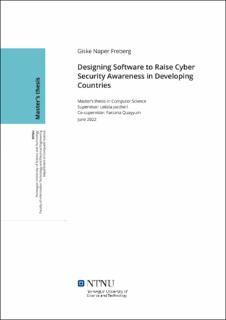| dc.contributor.advisor | Jaccheri, Letizia | |
| dc.contributor.author | Freberg, Giske Naper | |
| dc.date.accessioned | 2022-10-07T17:32:01Z | |
| dc.date.available | 2022-10-07T17:32:01Z | |
| dc.date.issued | 2022 | |
| dc.identifier | no.ntnu:inspera:112046434:44314813 | |
| dc.identifier.uri | https://hdl.handle.net/11250/3024719 | |
| dc.description.abstract | Innføringen av IKT og digitale verktøy har vært en akselerator for innovasjon og utvikling de siste tiårene. I utviklingsland er tilgjengeligheten av digitale verktøy og internettilgang økende. Koronapandemien illustrerte hvordan IKT kan påvirke sektorer som utdanning og helse. Med økende digital tilgang, dukker imidlertid negative aspekter forbundet med cyber sikkerhet opp. I velutviklede land er utfordringer knyttet til cybersikkerhet anerkjent. Den samme bevisstheten har imidlertid ikke blitt prioritert i utviklingsland. En økt tilstedeværelse på internett, krever økt oppmerksomhet rundt risikoene som aktivitet på internett utgjør. Særlig er de yngre generasjonene i utviklingsland utsatt.
Målet med dette masterprosjektet er å undersøke statusen for forskning innen bevissthet rundt cybersikkerhet i utviklingsland, samt å designe og utvikle en applikasjon for å øke bevisstheten rundt cybersikkerhet for unge mennesker i utviklingsland. Ved å introdusere en applikasjon med dette formålet, kan dens innvirkning utforskes.
Et systematisk litteraturstudie ble gjennomført i den innledende fasen av prosjektet, for å analysere litteratur relatert til forskningsfeltet. Litteraturstudiet identifiserte 18 primærstudier. For å akkompagnere funnene fra litteraturstudiet, ble det gjennomført semistrukturerte intervjuer med eksperter innenfor forskningsfeltet. Basert på funnene fra den innledende fasen, ble en fungerende prototype for en digital plattform designet og utviklet gjennom et samarbeid med Leap Learning. Prototypen ble deretter testet på deltakere som representerte prosjektets målgruppe. Observasjon og intervju ble brukt som datagenereringsmetoder for å evaluere prototypen.
Funnene viser at den utviklede prototypen ga deltakerne ny kunnskap og et høyere bevissthetsnivå for cybersikkerhet. I tillegg ble det identifisert fire faktorer for å sikre en vellykket opplæring av cybersikkerthetbevisshet i utviklingsland. Fremtidig forskning kan anvende disse anbefalt faktorene når forsking på cybersikkerhet i en kontekst med utviklingsland utføres.
Nøkkelord: Cybersikkerhetbevisshet, utviklingsland, ungdom, unge voksne, digital kompetanse, programvareutvikling, systematisk litteraturstudie | |
| dc.description.abstract | The introduction of ICTs and digital tools has been an accelerator for innovation and development for the past decades. In less-developed countries, the availability of digital tools and access to the internet is increasing. The Covid-19 pandemic illustrated how ICTs could impact sectors like education and health. However, negative aspects within the field of cyber security emerge with increasing online access. Cyber security challenges are well recognised in developed countries. However, cyber security awareness has not been prioritised in less-developed countries. An increased online presence demands increasing attention to the risks that online presence presents, to which the younger generations in developing nations are especially exposed.
The objective of this master thesis project is to investigate the current status of research within the field of cyber security awareness in developing nations and to design and develop an application for raising cyber security awareness for young people living in these areas. By introducing an application for this purpose, its impact and limitations can be explored.
A systematic literature review was conducted in the preliminary phase to analyse related literature within the field of research. The literature review identified 18 primary studies. To accompany the findings from the systematic literature review, semi-structured interviews with experts within the field of research were conducted. Based on the findings from the preliminary phase, a working prototype for a digital platform was designed and developed through a collaboration with Leap Learning. The prototype was then tested on participants representing the project’s target group. The data generation methods used for evaluating the prototype were observations and interviews.
The findings show that the developed prototype did provide participants representing the target group with new knowledge and a higher awareness level of cyber security. Additionally, four factors for successfully educating cyber security awareness in developing countries were identified. Future research can apply these recommended factors when conducting research in a developing country context.
Keywords: Cyber Security Awareness, Developing Countries, Adolescents, Young Adults, Digital Literacy, Software Development, Systematic Literature Review | |
| dc.language | eng | |
| dc.publisher | NTNU | |
| dc.title | Designing Software to Raise Cyber Security Awareness in Developing Countries | |
| dc.type | Master thesis | |
